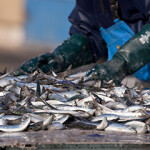Madagascar renews EU fishing agreement as scrutiny of onboard working conditions grows

Madagascar recently signed a sustainable fisheries partnership agreement with the E.U., becoming the latest African country to revive its fisheries agreement with the bloc in the midst of increasing concern regarding working conditions for African laborers on European fishing vessels.
On 30 June, the island nation signed a new four-year agreement that allows E.U. vessels – mainly from Spain, Portugal, Italy, and France – to access the country’s waters and fish for tuna and other species, under the management of the Indian Ocean Tuna Commission (IOTC).
Specifically, the agreement grants access to 32 E.U. tuna seiners, 13 surface longliners greater than 100 gross tonnage (GT), 20 surface longliners with a tonnage less than or equal to 100 GT, and support vessels in compliance with IOTC resolutions. Notably, the 65 total vessels allowed under the new SFPA is 29 fewer than allowed in the previous agreement, which ended in 2018.
Through the revived sustainable fisheries partnership agreement (SFPA), between 2023 and 2027, Madagascar will receive an estimated EUR 12.8 million (USD 13.8 million) from the E.U. and vessel operators. At least EUR 4.5 million (USD 4.9 million) of that total must be used to reinforce fisheries governance in Madagascar, which includes the monitoring, control, and surveillance of fishing activities to prevent illegal, unreported, and unregulated (IUU) practices.
Madagascar signed the agreement shortly after African unions began to vocalize concern about allegedly poor working conditions on European fishing vessels that have obtained permission to catch fish off the coasts of countries such as Senegal and Côte d’Ivoire.
“Super profitable companies and government authorities, benefiting from highly advantageous fishing agreements negotiated for them by the European Commission, think it is acceptable to disregard the clear provision for the International Labor Organization (ILO) seafarer’s minimum basic wage for an able seaman,” International Transport Workers’ Federation (ITF) Chair Johnny Hansen said.
Senegalese Fishers’ Union Secretary General Yoro Kane estimated monthly pay for locally employed fishers is sometimes one-third of the USD 658 (EUR 608) that the ILO has outlined for fishers.
However, Organisation of Large Frozen Tuna Ships’ Associate Producers (OPAGAC) Managing Director Julio Morón pushed back on the allegations of low pay offered by French- and Spanish-owned tuna vessels, as well as other concerns raised by the ITF.
“There is not a single seaman on board an E.U. vessel [who] gets less than the minimum ILO salary per month with all the compensations included because … apart from the minimum salary, they get a catch compensation that exceeds the ILO minimum,” Morón said.
To get a holistic perspective on the African labor situation, he said it’s important to consider “the salaries that African crews get on board Asian fleets operating in Africa that are far from even the national minimum salaries.”
Unlike Morón, Hansen said he believes Spanish and French fleets take advantage of African labor, but did agree that European vessels are “more patient and transparent,” compared to vessels from Asia that are engaged in “dark operations around Africa.”
Europêche, a representative body for E.U. fishers representing around 45,000 vessels – both artisanal and large-scale – serves as a key negotiator for the bloc and also defended the SFPAs with African nations, including Madagascar.
“In contrast to other fleets, E.U. purse-seiners actively engage with local infrastructure, utilizing port and shipyard facilities and landing fish in the country, including for local consumption,” Europêche Tuna Group Director Anne-France Mattlet said. “This approach also extends to supporting local employment by engaging Malagasy sailors through established manning agencies, and the French producers organization ORTHONGEL also trains Malagasy individuals as observers so [they can] then be employed on board E.U. vessels, which are all under 100 percent observer coverage.”
Besides claims of labor transgressions, there have also been concerns regarding ...
Photo courtesy of the World Bank




Share